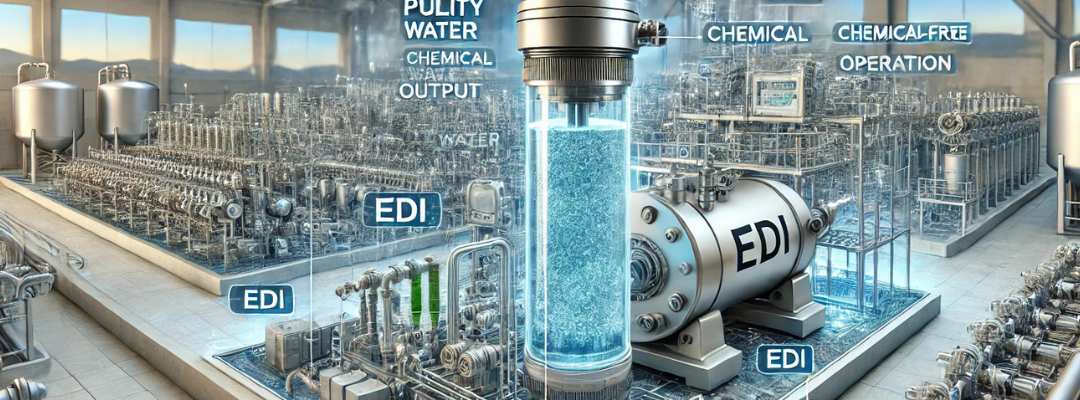What is an EDI Pump?
An EDI pump is a pump used in conjunction with an Electrodeionization (EDI) system, which is a water purification process that removes ionized species from water using ion-exchange membranes, resin, and an electric current. EDI systems are often used after reverse osmosis (RO) in ultra-pure water production. The EDI pump plays a critical role in ensuring the proper flow and pressure of water through the EDI module, where further purification takes place.
EDI pumps are designed to handle the specific requirements of water treatment processes, including consistent flow rates, precise pressure control, and compatibility with ultra-pure water conditions. EDI is widely used in industries where high-purity water is essential, such as in the pharmaceutical, power generation, semiconductor, and food and beverage sectors.
How EDI Systems Work:
- Feed Water (often pre-treated by reverse osmosis) enters the EDI module.
- The water passes through ion-exchange membranes and resin beds.
- An electric current is applied across the module, driving the separation of ions.
- Cations (positively charged ions) and anions (negatively charged ions) are removed through ion-exchange membranes.
- Purified water exits the EDI module, free of most dissolved salts and impurities.
The EDI pump is responsible for maintaining the necessary flow and pressure within the system to optimize the removal of ions.
Key Features of an EDI Pump:
- Precise Flow and Pressure Control:
- EDI pumps ensure the correct flow rate and pressure, which are essential for efficient ion removal in the EDI system. A consistent flow rate prevents fluctuations in the ion-exchange process and ensures optimal purification performance.
- Material Compatibility:
- The pump materials must be compatible with ultra-pure water and resist leaching of any contaminants. Common materials include stainless steel, high-grade plastics (such as PVDF or polypropylene), and EPDM or PTFE for seals.
- Low Pulsation:
- EDI systems require smooth, continuous flow with minimal pulsation to maintain the integrity of the ion-exchange membranes and resin beds. Pumps with low pulsation ensure a stable process.
- High Efficiency:
- EDI pumps must be energy-efficient since the EDI process is typically continuous, requiring the pump to run for extended periods. Variable speed drive (VSD) pumps can adjust their speed to meet changing system demands, reducing energy consumption.
- Corrosion Resistance:
- Since the pump is exposed to deionized water (which can be corrosive), it must be constructed from corrosion-resistant materials such as 316 stainless steel or specially treated plastics.
Applications of EDI Pumps:
EDI pumps are used in a variety of industries where high-purity water is required for sensitive processes. Below are some key application areas:
- Pharmaceutical Industry:
- In pharmaceutical manufacturing, ultra-pure water is essential for producing sterile products and meeting regulatory standards (such as USP water). EDI pumps are used in purified water systems and water-for-injection (WFI) systems to produce water that meets stringent purity standards for drug formulation and production.
- Power Generation:
- In boiler feed water treatment, ultra-pure water is required to prevent scaling and corrosion in high-pressure boilers and steam turbines. EDI systems with properly controlled EDI pumps ensure that water is free from dissolved salts and minerals, protecting critical power generation equipment.
- EDI pumps are used in the polishing stage of water treatment, typically after reverse osmosis, to further remove ions and ensure ultra-pure water quality for steam production.
- Semiconductor and Electronics Manufacturing:
- The semiconductor industry requires ultra-pure water (UPW) for wafer fabrication, microchip production, and rinsing processes. Any contaminants can lead to defects in the microscopic structures of electronic components.
- EDI pumps ensure that ultra-pure water is continuously supplied to semiconductor fabs, preventing impurities from contaminating the delicate manufacturing process.
- Food and Beverage Industry:
- In some food and beverage processing applications, particularly in industries like bottled water production and brewing, high-quality water is needed for product consistency, taste, and safety.
- EDI pumps help supply ultra-pure water for ingredient mixing, cleaning processes, and steam generation in food and beverage plants.
- Laboratories and Research:
- Laboratories that require ultra-pure water for sensitive analytical techniques (such as HPLC and spectrophotometry) use EDI systems with specialized pumps to ensure consistent water quality.
- EDI pumps ensure that the flow of water to laboratory instruments remains uncontaminated, providing the necessary purity for reliable experimental results.
- Cosmetic and Personal Care Products:
- The cosmetic industry uses ultra-pure water as a key ingredient in lotions, creams, shampoos, and other personal care products. EDI systems, supported by EDI pumps, help produce ultra-pure water to ensure product safety and stability.
- Healthcare:
- Hospitals and healthcare facilities use ultra-pure water in various applications, such as sterilization of instruments, dialysis, and medical device manufacturing. EDI pumps ensure that the ultra-pure water supply remains consistent and meets medical-grade purity standards.
Conclusion:
An EDI pump is a critical component of the electrodeionization (EDI) water purification process, ensuring the proper flow and pressure necessary for the removal of ions and the production of ultra-pure water. These pumps are used in industries that require high-purity water, such as pharmaceuticals, power generation, electronics, and food and beverage manufacturing. Key features like precise flow control, corrosion resistance, and material compatibility make EDI pumps essential for maintaining the efficiency and reliability of EDI systems in demanding applications.

